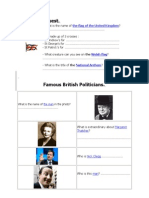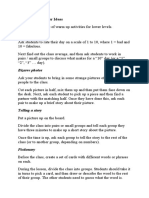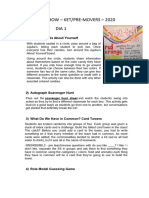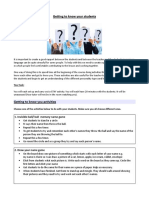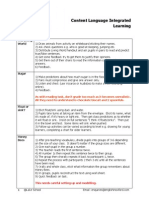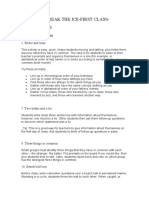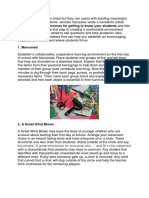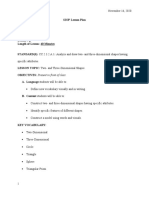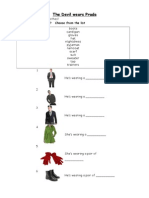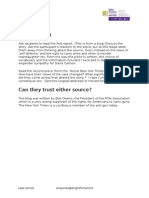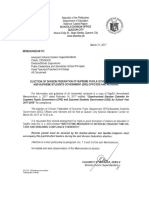Get Into Shape Lesson Plan: Music Circles
Get Into Shape Lesson Plan: Music Circles
Uploaded by
lakeschoolCopyright:
Available Formats
Get Into Shape Lesson Plan: Music Circles
Get Into Shape Lesson Plan: Music Circles
Uploaded by
lakeschoolOriginal Title
Copyright
Available Formats
Share this document
Did you find this document useful?
Is this content inappropriate?
Copyright:
Available Formats
Get Into Shape Lesson Plan: Music Circles
Get Into Shape Lesson Plan: Music Circles
Uploaded by
lakeschoolCopyright:
Available Formats
Get into Shape Lesson Plan
Music circles
Prepare a question structure (or a variety) that will generate a wide range of verb phrases. Or questions connected with a particular topic, vocabulary area. Get some lively music and a music player. 1) Divide the pupils into 2 groups. 2) Ask the students to stand in two circles, one inside the other. Tell the children they are going to dance/move in a circle and when the music stops that they should turn to a partner in the other circle and ask a question. 3) Play and stop the music, either saying the question for the pupils to repeat or pointing to it on the board. The inside circle of pupils should ask the question first. The outside circle of pupils should ask the question after giving their own answer. Ideas and adaptations: 1. What did you do the weekend? Inside partner likes dogs, outside partner likes cats. Persuade your partner to change their mind. Later ellicit other comparative pairs. E.g. sea, mountains, Iphone, android, McDonalds Burger King) Mime 5 activities you hate doing and your partner guesses them then swap and mime 5 activities you love doing and guess them. (this is great for natural use of gerund form) The Yes No Game. Where one person tries to force their partner to say YES or No. If they do they swap roles. Who can last the longest? I ellicit other phrases they can use instead of yes and no and highlight how this game is good for check questions.
Change places if..
Ask the children to sit (on their chairs) in a circle or several circles if you have a big class. 1) Stand in the middle of the circle. If there are several circles, ask a different pupil to stand in the middle of each circle. The person standing in the middle does not have a seat in the circle. 2) Start the activity by giving an instruction using the target language. For example, "Change places if you're wearing a watch." All the pupils wearing a watch stand up and sit down again in
1 @Lake School
Email: enquiries@englishinoxford.com
another seat. 3) The person standing in the middle of the circle tries to sit down in a free seat. 4) The person left without a seat now gives a new instruction. For example, "Change places if you're wearing white socks." This works well with grammar structures too, e.g. change places if you have ever. + present perfect. Discussion wheels Get a small coin for each pair of pupils in the class. Prepare a structure, word, topic or tense that you want to practise. Youll need eight items. For example, Make and Do expressions
Make a phone call, make arrangements, make a mistake, make an excuse Do housework, do shopping, do something interesting, do ones best
Past time markers
Yesterday, last night, at the weekend, last year, on Sunday, on my last birthday, last Christmas, an hour ago
1) Tell the children to draw a large circle with eight lines, so that it looks like a bicycle wheel. Either dictate the items that you want to practise, or ask the students to brainstorm them. Tell the pupils to write each item in one space on the wheel. 2) Hand out a coin to each pair of students. Tell pupils to take turns to spin a coin on the wheel and ask and answer questions. The pupil who spins the coin must ask a question using the language in the space that the coin lands on. Variations Instead of asking and answering questions, children can speak for a 30 seconds/a minute on a topic, or find words containing a particular sound to read out, or find collocations for the word. Discussion wheels can be swapped between pairs of pupils (good for fast finishers). Sentences in a hat. Cut up scrap paper into small squares so that there are three or four for each pupil in the class. Or . . . ask the children to do it! 1) Give three or four small blank pieces of paper to each pupil in the class and ask them to write one piece of information on each piece of paper. For example, to practise simple past forms: things you ate or drank yesterday / things you did at the weekend futures : three things you're going to do tonight or at the weekend the present perfect: places you have visited / books you have read in English / things youve always wanted to do, but havent yet! 2 @Lake School Email: enquiries@englishinoxford.com
Conditionals: things you would do if you won 1,000,000 Then ask them to fold up their pieces of paper and put them in a hat (or a box). 2) Mix up the folded bits of paper in the hat or box and ask the pupils to take one each, unfold it and find the person who wrote it by asking questions. Good, better, best. 1) Ask the pupils to write a noun on each of their four squares of paper. 2) Collect all the pieces of paper and shuffle them. 3) Ask the students to work in groups of 3 or 4 and share the pieces of paper out between the groups. 4) Ask each group to make two piles of words, face down and then take it in turns to turn up a word from each pile. They should use the words they have turned up to make a comparative sentence. You can make this activity more specific by asking the students to write words in a given category, e.g. animals, famous people, jobs, leisure activities, inventions , character traits, crimes etc. Variation Ask the pupils in pairs to rank their nouns in order, according to certain criteria and in their opinion, for example, from the smallest to the biggest the cheapest to the most expensive the most interesting to the least interesting the least important/serious to the most important/serious the earliest to the most recent (chronologically) This is great for low level and mixed ability classes. Shape personality test 1) Dictate or draw a single circle, a triangle, 3 circles, a rectangle and a straight line. 2) Then ask pupils to draw round the shapes to create something else. 3) Ask them to write 3 adjectives describing what they have drawn. 4) In pairs they explain their drawings. This was a circle, now its a sun. Its big, yellow and hot. If appropriate, give pupils an explanation of what each drawing means. 1 = how you see yourself 2 = what you think of your family 3 = what you think of your friends 4 = what you think of the opposite sex 5 = how you see your future Youre a Star because 3 @Lake School 1) Draw a star shape on the board for children to copy. 2) Give each pupil the name of another pupil in the class (and keep Email: enquiries@englishinoxford.com
it secret). 3) Give each pupil a piece of paper and ask them to draw a star (and cut it out). Brainstorm positive personal attributes. Tell the pupils to write a positive message for their secret friend. For example, Youre a star because you make me smile. Youre a star because you are kind. Youre a star because you are funny. Youre a star because you help me when I have a problem. Ask the students to give their sentence to the person (star) that they wrote it for, and say the sentence at the same time.
4 @Lake School
Email: enquiries@englishinoxford.com
You might also like
- Commentary On Lesson PlanDocument3 pagesCommentary On Lesson PlanThaqif Al Mahdi100% (1)
- Marylina Serio Cover Letter Lto ListDocument1 pageMarylina Serio Cover Letter Lto Listapi-251504151No ratings yet
- IcebreakersDocument3 pagesIcebreakersRandy RebmanNo ratings yet
- Why The Banana Split and Other PersonificationsDocument2 pagesWhy The Banana Split and Other Personificationsapi-285115824No ratings yet
- Class 2 Shapes Lesson PlanDocument15 pagesClass 2 Shapes Lesson PlanHarsha BhamreNo ratings yet
- The New UK WebquestDocument6 pagesThe New UK WebquestlakeschoolNo ratings yet
- Interim MagazineDocument48 pagesInterim MagazinePriyanka MokkapatiNo ratings yet
- Warmers & Coolers ActivitiesDocument6 pagesWarmers & Coolers ActivitiesDamien O'DonnellNo ratings yet
- Get Into Shape(s) !Document10 pagesGet Into Shape(s) !lakeschool100% (1)
- Deloping Literacy SkillsDocument15 pagesDeloping Literacy SkillslakeschoolNo ratings yet
- AULA SHOW - KetDocument5 pagesAULA SHOW - Ketbmpiza93No ratings yet
- Primary Lesson PlansDocument11 pagesPrimary Lesson Plansapi-294453362No ratings yet
- Icebreaker ActivitiesDocument5 pagesIcebreaker ActivitiesAras'ın MaceralarıNo ratings yet
- (Tatarchuk - G.M.) Practical Ideas For Efl - TeachersDocument20 pages(Tatarchuk - G.M.) Practical Ideas For Efl - TeachersSrisuda DesiderataNo ratings yet
- Wizard - Warm Up and Closing ActivitiesDocument12 pagesWizard - Warm Up and Closing ActivitieslazaromsousaNo ratings yet
- Activity Plan 2021-22Document10 pagesActivity Plan 2021-22Amrin TalukdarNo ratings yet
- Guessing Games: New English in Use ESO 2 Photocopiable © Burlington BooksDocument2 pagesGuessing Games: New English in Use ESO 2 Photocopiable © Burlington BooksRosa MartinezNo ratings yet
- Ice BreakersDocument24 pagesIce BreakersAngelNo ratings yet
- ICE BREAKERS Get To Know One AnotherDocument5 pagesICE BREAKERS Get To Know One AnotherFlorentina BugaNo ratings yet
- 50 No-Prep or Low-Prep ActivitiesDocument14 pages50 No-Prep or Low-Prep ActivitiesTóthMariannNo ratings yet
- Getting To Know You Activities and InstructionsDocument3 pagesGetting To Know You Activities and Instructionsإيهاب غازيNo ratings yet
- Money Vocabulary Lesson PlanDocument2 pagesMoney Vocabulary Lesson Planneerajkumar890No ratings yet
- Beginners Icebreakers: 1. Paper Airplane YouDocument3 pagesBeginners Icebreakers: 1. Paper Airplane YouEduardoJoseSaletaSanchezNo ratings yet
- Ice BreakersDocument5 pagesIce BreakersMagelyn NBNo ratings yet
- Content Language Integrated Learning: The Living WorldDocument15 pagesContent Language Integrated Learning: The Living WorldSimohamed El meskiNo ratings yet
- 10 Fun Icebreakers For The Beginning of The YearDocument5 pages10 Fun Icebreakers For The Beginning of The YearТамара ПиндосоваNo ratings yet
- Games To Break The IceDocument3 pagesGames To Break The IceJuliana MoreiraNo ratings yet
- Grammar Year 3Document43 pagesGrammar Year 3ayuwak9188No ratings yet
- Krs Lesson PlanDocument9 pagesKrs Lesson Planapi-310893047No ratings yet
- KH Lesson PlanDocument3 pagesKH Lesson Planapi-382826383No ratings yet
- Warm UpsDocument4 pagesWarm UpsEd JorginhoNo ratings yet
- Vocabulary Review ActivitiesDocument7 pagesVocabulary Review ActivitiessmrNo ratings yet
- Name: Steven Carson Grade Level: 1 Time: 1 Hour (The Afternoon Will Be Available Subject: ArtDocument6 pagesName: Steven Carson Grade Level: 1 Time: 1 Hour (The Afternoon Will Be Available Subject: Artapi-295843914No ratings yet
- Whole Group Reading Lesson PlanDocument3 pagesWhole Group Reading Lesson PlanKathleen MarieNo ratings yet
- Class Ice BreakersDocument5 pagesClass Ice BreakersAna MaríaNo ratings yet
- Activities For EnglishDocument8 pagesActivities For EnglishmazianNo ratings yet
- Prek Social Studies LessonDocument3 pagesPrek Social Studies Lessonapi-252145631No ratings yet
- 300 Fantastic 5 Min ActivitiesDocument64 pages300 Fantastic 5 Min Activitiesfelipe perreiras100% (5)
- 75 and More Teaching IdeasDocument8 pages75 and More Teaching Ideasapi-251399895No ratings yet
- Weekend Warmers+Document8 pagesWeekend Warmers+Anonymous kdFY3aNo ratings yet
- SM2ed Teacher's Resources Worksheet J L6 U9Document5 pagesSM2ed Teacher's Resources Worksheet J L6 U9English Connection Alcorcón Retamas - teacherNo ratings yet
- Module: Adjectives, Kinds of Adjectives, Order of Adjectives ObjectivesDocument10 pagesModule: Adjectives, Kinds of Adjectives, Order of Adjectives ObjectivesYamini KumarNo ratings yet
- 80 Sponge ActivitiesDocument5 pages80 Sponge ActivitiesAnna K. RiveraNo ratings yet
- MC 2nd Term English Week 2 2023-2024Document16 pagesMC 2nd Term English Week 2 2023-2024Vanezzitta PachuchoNo ratings yet
- Teacher's Instruction MannualDocument8 pagesTeacher's Instruction MannualLeila UngutbayevaNo ratings yet
- Four-Part Process For Getting To Know Your StudentsDocument10 pagesFour-Part Process For Getting To Know Your StudentsirmaNo ratings yet
- Unit 7Document30 pagesUnit 7spicypandarok4No ratings yet
- Siop Lesson PlanDocument4 pagesSiop Lesson Planapi-522747312No ratings yet
- Up3 ss15 Justus RobertsDocument6 pagesUp3 ss15 Justus Robertsapi-290860053No ratings yet
- Cool Tips For Warm-Ups: Braz-Tesol Rio Chapter: One-Day SeminarDocument3 pagesCool Tips For Warm-Ups: Braz-Tesol Rio Chapter: One-Day SeminarFruit SaladNo ratings yet
- Didactic Games in Teaching EnglishDocument6 pagesDidactic Games in Teaching EnglishNataszaWalzNo ratings yet
- Close Reading Lesson PlanDocument3 pagesClose Reading Lesson Planapi-282650693No ratings yet
- Science Lesson For 3rd GradeDocument3 pagesScience Lesson For 3rd Gradeapi-378880030No ratings yet
- 2020-02 - Warm-Up ActivitiesDocument6 pages2020-02 - Warm-Up ActivitiesTrần Thu HàNo ratings yet
- Vapa Di Lesson Plan Template Pre-Tpa SP 11 Rough DraftDocument6 pagesVapa Di Lesson Plan Template Pre-Tpa SP 11 Rough Draftapi-227014640No ratings yet
- Current Iss12Document3 pagesCurrent Iss12tonybullenNo ratings yet
- SIOP Lesson Plan - ShapesDocument3 pagesSIOP Lesson Plan - ShapesPratibha PrasadNo ratings yet
- Lesson Plan Metaphorical ExpressionDocument4 pagesLesson Plan Metaphorical Expressionapi-335464934No ratings yet
- IcebreakerDocument2 pagesIcebreakerapi-386092719100% (1)
- SioplessondraftsottileDocument5 pagesSioplessondraftsottileapi-522660869No ratings yet
- More Icebreakers. Perfect start for your language class: Teach - Love - Inspire. bel activity + games bookletsFrom EverandMore Icebreakers. Perfect start for your language class: Teach - Love - Inspire. bel activity + games bookletsNo ratings yet
- Fonix is Phun! Some Seriously Good Ideas for Introducing Single Sounds Using 100s of Everyday Fun Classroom ActivitiesFrom EverandFonix is Phun! Some Seriously Good Ideas for Introducing Single Sounds Using 100s of Everyday Fun Classroom ActivitiesNo ratings yet
- The Devil Wears Prada WorksheetDocument10 pagesThe Devil Wears Prada Worksheetlakeschool100% (2)
- Critical Thinking Reading TextDocument4 pagesCritical Thinking Reading TextlakeschoolNo ratings yet
- Phrasal Verbs-Secondary and AdultDocument3 pagesPhrasal Verbs-Secondary and AdultlakeschoolNo ratings yet
- Songs, Rhymes and ChantsDocument21 pagesSongs, Rhymes and ChantslakeschoolNo ratings yet
- Using Images - CTPCDocument3 pagesUsing Images - CTPClakeschoolNo ratings yet
- Blended Learning - CTPCDocument7 pagesBlended Learning - CTPClakeschoolNo ratings yet
- Icebreakers-Adult and SecondaryDocument4 pagesIcebreakers-Adult and SecondarylakeschoolNo ratings yet
- Blended Learning - CTPCDocument7 pagesBlended Learning - CTPClakeschoolNo ratings yet
- Blended LearningDocument2 pagesBlended LearninglakeschoolNo ratings yet
- Communication in The Classroom - CTPCDocument8 pagesCommunication in The Classroom - CTPClakeschoolNo ratings yet
- CollocationDocument5 pagesCollocationlakeschoolNo ratings yet
- The Curriculum Stakeholders and Their RolesDocument4 pagesThe Curriculum Stakeholders and Their RolesAnonymous wD8hMIPxJNo ratings yet
- NL 21-9-2016pdfDocument6 pagesNL 21-9-2016pdfshedzaNo ratings yet
- Kathryn Simmonds: A Student GuideDocument4 pagesKathryn Simmonds: A Student GuideThe Charles Causley TrustNo ratings yet
- Silabus Bahasa Inggris Kelas XiiDocument8 pagesSilabus Bahasa Inggris Kelas Xiipo_er75% (4)
- 16-17 Class DisclosureDocument4 pages16-17 Class Disclosureapi-323179351No ratings yet
- Learning Latin and GreekDocument248 pagesLearning Latin and GreekMarcos Augusto AngelTdemonio100% (29)
- Read AloudDocument23 pagesRead AloudZawiyahShaariNo ratings yet
- Qualifications:: 6 Grade Science TeacherDocument3 pagesQualifications:: 6 Grade Science Teacherapi-437998781No ratings yet
- Core Lesson PlanDocument2 pagesCore Lesson Planapi-401944586No ratings yet
- Reaction Paper: GRADUATE SCHOOL DAY: Research Colloquium and ForumDocument2 pagesReaction Paper: GRADUATE SCHOOL DAY: Research Colloquium and ForumMisai Yatot100% (1)
- KONSELOR Supervision PDFDocument9 pagesKONSELOR Supervision PDFFardhatul Riani PutriNo ratings yet
- Unit 12 Speaking English 11Document3 pagesUnit 12 Speaking English 11Thuong NguyenNo ratings yet
- Gap Year EssayDocument1 pageGap Year EssayYa Li100% (1)
- Narrative OF Kindergar Ten Class: Limunsudan Bayug Falls Elementary SchoolDocument5 pagesNarrative OF Kindergar Ten Class: Limunsudan Bayug Falls Elementary SchoolRomel Anacleto BalitoNo ratings yet
- Pumpkin TimeDocument4 pagesPumpkin Timeapi-307487781No ratings yet
- XYXYXYXYXYXDocument38 pagesXYXYXYXYXYXAtti IwanNo ratings yet
- District 1 Candidate Martha Barrett QuestionnaireDocument14 pagesDistrict 1 Candidate Martha Barrett QuestionnaireJacksonville Public Education FundNo ratings yet
- Technical Rescuer: Water Rescue: Special NotesDocument2 pagesTechnical Rescuer: Water Rescue: Special NotesAhmad Faris AldjufriNo ratings yet
- William Oliver Bundy, and W.H. Burnett - Life of William Madison McDonald, PH.D (1925)Document402 pagesWilliam Oliver Bundy, and W.H. Burnett - Life of William Madison McDonald, PH.D (1925)chyoungNo ratings yet
- Topic ProblemDocument3 pagesTopic ProblemIvyjoyCayaboNo ratings yet
- Lesson Plan f2 (Group5)Document4 pagesLesson Plan f2 (Group5)shazrina100% (1)
- Numeracy Action Plan 2023 2024Document3 pagesNumeracy Action Plan 2023 2024Francis Anthony EspesorNo ratings yet
- Bulletin 11 15 12Document5 pagesBulletin 11 15 12Michael AllenNo ratings yet
- Election of Division of Supreme Pupils Government (SPG) and Supreme Students Government (SSG) Officers and AdvisersDocument11 pagesElection of Division of Supreme Pupils Government (SPG) and Supreme Students Government (SSG) Officers and AdvisersArimJhoOlubmara100% (3)
- Lesson 1 - Tune inDocument5 pagesLesson 1 - Tune inapi-265620665No ratings yet
- Intervention Plan TemplateDocument7 pagesIntervention Plan TemplateSergius Simon100% (1)
- Effectiveness of CLA in Teaching ForceDocument11 pagesEffectiveness of CLA in Teaching ForceNeniel DumanjogNo ratings yet





